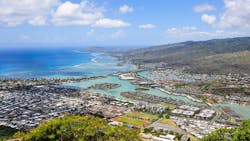Hawaii Department of Health cites East Honolulu Wastewater Treatment plant for effluent violations
The Hawaiʻi Department of Health (DOH) has issued a Notice of Violation and Order (NOVO) to Hawaii American Water, for discharging effluent in exceedance of National Pollutant Discharge Elimination System (NPDES) Permit No. HI 0020303 limits from the East Honolulu Wastewater Treatment Plant (Facility) into the Pacific Ocean.
Between August 2022 and April 2024, Hawaii American Water discharged effluent from the facility in exceedance of NPDES permit limits for ammonia nitrogen on 14 occasions. The facility also failed to submit the required written noncompliance reports on two occasions.
The NOVO requires Hawaii American Water to pay a penalty of $47,750 and orders corrective actions to prevent future exceedances from occurring.
“Ammonia is derived from the breakdown of proteins and amino acids in wastewater,” said Kathleen Ho, the deputy director for the Environmental Health Administration, in a press release. “High concentrations of ammonia can have toxic effects on aquatic organisms and contributes to excess nutrients in the water. As such, the discharge of ammonia above allowable limits into state waters is unacceptable.”
All persons, including business owners, government agencies and visitors must comply with environmental laws designed to protect Hawaiʻi. Failure to comply with water pollution laws may subject violators to monetary penalties of up to $60,000 per day, per violation.
The DOH Clean Water Branch protects public health and the environment by prohibiting discharges which impair water quality, keeping Hawaiʻi’s waters fishable and swimmable for everyone.
A press release states that owners and operators of wastewater systems must comply with environmental regulations that are in place to protect the public and responds to pollution of state waters. Failure to do so results in legal action by the state, federal partners and/or private citizens.
